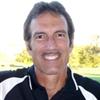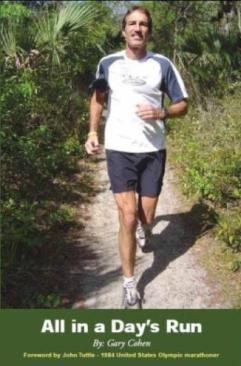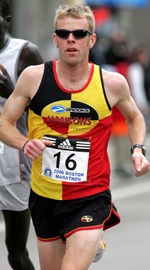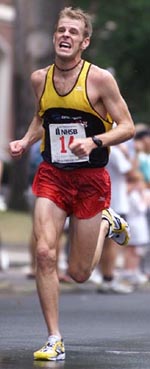|
|
|
 garycohenrunning.com
garycohenrunning.com
be healthy • get more fit • race faster
| |
|
 
"All in a Day’s Run" is for competitive runners,
fitness enthusiasts and anyone who needs a "spark" to get healthier by increasing exercise and eating more nutritionally.
Click here for more info or to order
This is what the running elite has to say about "All in a Day's Run":
"Gary's experiences and thoughts are very entertaining, all levels of
runners can relate to them."
Brian Sell — 2008 U.S. Olympic Marathoner
"Each of Gary's essays is a short read with great information on training,
racing and nutrition."
Dave McGillivray — Boston Marathon Race Director
|
 |


|
| Brian Sell was a member of the 2008 United States Olympic team which competed in Beijing, China in the marathon where he finished in 22nd place with a time of 2:16:17 He finished third in the Olympic Trials Marathon behind Ryan Hall and Dathan Ritzenhein with a time of 2:11:40. Brian finished sixth overall at the 2006 Boston Marathon in his personal best time of 2:10:51. He then lowered his PR to 2:10:47 with a fourth place finish at the 2006 Chicago Marathon. Brian scored an impressive victory at the 2006 USA Half-Marathon Championships with his win in a new personal best time of 1:02:39. In May, 2005 he won the USA 25 km Championships in Grand Rapids, Michigan in 1:15:27, the seventh fastest 25k time raced by an American. Brian led Team USA to a fourth-place finish at the 2005 Marathon Cup in Helsinki by finishing ninth. In 2004 he finished 13th at USA Olympic Trials Marathon in 2:17:20. He is a 2001 graduate of Saint Francis College (Loretto, PA) where he was NEC Champion in the following events: steeplechase (9:08.66), 5000m (14:26.28) and 10000m (30:41.1) in 2001: 3000m in 1999 and 2000 and 5000m (indoor) in 1999 and 2000. He was the Most Valuable Performer of the 2001 NEC Outdoor Track and Field Championships. Brian earned All-American Cross Country honors in 2000, was All American in the 10000m in 2001 and an Academic All-American for the 2000-01 year. Previously at Messiah College (Grantham, PA) he was MAC Champion in the 5000m and steeplechase in 1998 and the 1500m in 1997. At Northern Bedford County High School (Loysburg, PA) Brian was County and District Champion in the 1600m in 1994, 1995 and 1996 and placed 8th in the state championship meet during his senior year. His personal best times include: 3000m – 8:07; 3000m steeplechase – 8:52; 5k – 13:59; 8k – 22:57; 10k – 28:28; 20k – 59:18; half marathon – 1:02:38 and marathon- 2:10:47. Brian is a member of the Hansons-Brooks Distance Project team coached by Kevin and Keith Hanson. He resides in Rochester Hills, Mich. with his wife, Sarah, and seventeen month-old daughter, Lily Grace. |
|
| GCR: | You have devoted more than a decade to becoming a faster distance runner. For over half of this time you focused on the marathon with a goal of making the U.S. Olympic team. Now that you can reflect back, how does it feel to know that you are and always will be an Olympian? |
| BS | It feels good. It definitely helps with people who ask how you can be a 'professional' distance runner. Everybody can associate with the Olympics, and to make the team is a big reinforcement that the training and mileage over the past 10 years has been worth it. |
|
| GCR: | The Olympic Marathon is usually slower paced than major marathons primarily due to concerns about the summer heat. Did you do anything differently with your race preparation and race day strategy due to the heat and humidity in Beijing? |
| BS | I feel like I was ready to run 2:16 on a 95 degree day. In hindsight, I wish I would have trained at a little faster pace in my workouts, because we were planning for a very hot and humid day. I did most of my easier distance days in a heavy cotton sweatshirt and we went to Florida to train for a week or so to get a few more degrees of heat before heading over to China. |
|
| GCR: | Right from the start the Olympic Marathon field set out at an unexpected fast pace. Even though you held back relative to other runners, were you out of your 'comfort zone' and in retrospect, do you feel you should have went out even more conservatively? |
| BS | I feel like I might have had a better race if I had gone out a little slower, but not that much better. I may have been able to get top 20, but that would have been about it. I thought I was in about 40th place at 20 miles while I was actually about 20th and kind of hit a mental and physical wall at that point. I had this vision of passing guys left and right the last 8 miles or so, and when that wasn’t happening, I kind of fell apart. |
|
| GCR: | You ran strong through 35k and then were unable keep your pace the remainder of the way. Was it fatigue, dehydration or both and how disappointing was it to not finish as quick as you had hoped? |
| BS | It was about 50% mental and 50% physical. My three-month segment leading up to the race was not what I had hoped for. Before most of my 'good' marathons, I have been able to run three to five miles at 4:50 pace toward the end of my 22 milers. This time I was struggling to hit 5:10, so I don’t think I was as strong as before. That coupled with not catching guys toward the end like I thought I was going to did me in at about 20 miles. |
|
| GCR: | Despite fading during the last few miles, you still finished in 22nd place in the Olympic Marathon. Describe the feeling of accomplishment, especially when you think back seven years ago to when you were a very good, but not outstanding collegiate runner. |
| BS | It felt good just to be there, but honestly my low goal was to be top 20 and to run about a 2:13. I was just outside of that, and I sort of felt like I left the rest of the US team of Ritz and Hall down a little. Had I run a 2:13, I would have been right in the mix and we may have had three guys in the top 15. I am very happy with making the team, considering that I wasn’t on the same planet as those guys in high school and college, but I would rather be looking forward and trying to improve even more, than saying look how far I’ve come. |
|
| GCR: | You’ve raced at major marathons in Boston and Chicago and run past large cheering crowds. How were Beijing’s spectators during the Olympic Marathon? |
| BS | There were thousands of people out there, but the crowd was kept about 100 feet or so away from the course. You could see there were a lot of spectators, but it wasn’t like a Boston or Chicago in that they weren’t able to get right in your face and push you along. |
|
| GCR: | Did you get to enjoy going to the Olympic Opening and Closing Ceremonies, watch other events and tour the city and any other areas in China as part of your Olympic experience? |
| BS | No. I was over in 2001 for the World University Games and I got to see the Great Wall, Tiananmen Square, etc at that time. I didn’t want to do anything too strenuous since this was the biggest race of my life. I skipped the opening ceremonies because I was in Florida still doing some of my heavier workouts and the closing ceremonies to have dinner with my family, who I didn’t get to see much while I was there. |
|
| GCR: | In addition to your 22nd place finish the other two Americans, Dathan Ritzenhein and Ryan Hall, finished in ninth and tenth place, respectively. There were also some excellent U.S. marathon runners who didn’t make the team. What do your performances on the world stage say about the state of high-level men’s marathon racing in the United States? |
| BS | I think Ritz and Hall both ran the equivalent of 2:08 performances in Beijing and they still have two more Olympics in them. I think it was a good step in the right direction for US distance running, but we can’t be satisfied, especially with the world record being lowered to sub 2:04 recently. The world is continuing to get faster, and so U.S. runners must continue to do the same. |
|
| GCR: | Just making the 2008 U.S. Olympic team in the marathon is a tremendous achievement as this was probably the toughest field assembled since the 1984 Olympic Trials. What was your strategy going into the trials that you thought gave you the best chance at making the team and what adjustments did you make during the race? |
| BS | My strategy was to run 5:00 pace from the gun and stick to it. When we previewed the course in October, Kevin and Keith Hanson believed that it was about two or three minutes slower than a course like Chicago. They also believed that a 2:08 effort would make the team, so a 2:11 on the Central Park course would be enough to make it. When the pack of six broke away, I had to make a choice to go with them or stick with the 5:00 minutes flat pace. Luckily, all but two guys fell apart and came back to me and I made the team. |
|
| GCR: | Around 20 miles into the race you were in fourth place and moving up on Dan Browne. What were you thinking as you reeled him in and caught him a couple of miles later, did you make a surge to pass him and did he show any resistance? |
| BS | When I saw Dan in the distance, I just wanted to pass him as fast, but as easily as possible. I tried to go by hard, but look comfortable doing it. I didn’t really surge too hard, but with 5 miles to go, I knew anything could happen and I didn’t want to lose my spot in that last loop. |
|
| GCR: | How were the last four miles mentally and physically when you knew that you just had to maintain your effort and you would make the Olympic team? |
| BS | I didn’t really think that. I knew I had some studs behind me and my kick was probably the weakest in the field, so I just wanted to get to that finish line as quickly as possible. I had the former world record holder, an Olympic silver medalist and a few 27 minute 10k guys behind me, and I didn’t know who might be coming for me that last four miles. |
|
| GCR: | When you crossed the finish line and knew you had punched your ticket to Beijing what thoughts went through your mind? |
| BS | It was a great feeling, like all the work and miles and running through injuries had been worth it. My wife and family have put up with a lot the past seven years, so it was good that they could be there to realize a dream with me. Most of my college teammates, extended family, and some of my high school buddies were there too, so it was good to do something big in front of them. I have had some stinky races when people have driven a long way to watch me, so it felt really great. |
|
| GCR: | At the 2004 Olympic Trials Marathon you were aggressive, dropped the pace in mid-race to the 4:50-4:55 range and opened up a lead that grew to 90 seconds. You eventually hit 'the wall' and faded to a 13th place finish. How disappointing was your performance in the latter stages of the race and how has it helped you as a racer since then? |
| BS | It was a little disappointing, but I didn’t deserve to win that race. I knew I had to get after it when we went through two miles in about 10:50, but in hindsight, it wasn’t very respectful to the guys like Meb, Alan, and Dan who had 2:09 PRs. I should have stayed with the pack and tried to make a move like that around halfway, rather than taking off on my own into the wind like I did. |
|
| GCR: | You had a breakthrough year in 2006 lowering your personal best marathon twice with a fourth place finish at Boston in 2:10:55 and a sixth place effort at Chicago in 2:10:47. Were you doing anything different that led to your improvement or was it mainly the accumulation of many years of steady training? |
| BS | I had increased my mileage to the highest it had ever been, and I think it was the accumulated mileage over the past 10 years since I began to take running very seriously in college. I was nailing workouts in addition to running 140-160 miles a week, and feeling good doing it. Most importantly, I had a good group of guys pushing me every day. |
|
| GCR: | You are a member the Hansons-Brooks Distance Project team coached by Kevin and Keith Hanson. How valuable has it been to have their coaching and to train with a group of talented, motivated runners? |
| BS | It has been very good. I’ve seen them grow in their abilities over the past seven years I have been a team member. They aren’t afraid to change something if it isn’t working, but they have a strong belief in high mileage, which parallels mine. Although I think it was 100% my fault, they thought they trained me wrong for Beijing and went over what we could have done differently. But I think I was subpar in how I ran the segment and take all the blame. |
|
| GCR: | When most informed distance running fans think of Brian Sell, they think of a runner who races smart with steady, even pacing. What has allowed you to evolve into this type of racer and to not get caught up with many runners who start out too fast in races? |
| BS | The 2004 Olympic Trials taught me all I needed to know. I was probably in about 2:13 shape for that, but I ran miles three to 22 at about 2:09 pace. The pain I felt the last four miles was the hardest, but most effective teacher for how important pace is for me. |
|
| GCR: | How did your earlier experiences with your high school and college teams and with those coaches shape you? What did you learn that helped you to blossom as a runner post-collegiately? |
| BS | I had three different high school coaches in high school. One was a football line coach, one was the girls gym teacher and one was my English teacher. They might not have had the experience necessary to coach a team well, but they all cared and put time into the team and that’s all you can ask for at the high school level in my opinion. In college I had two good coaches, Dale Foglesanger at Messiah and Kevin Donner at Saint Francis. Both were very informed and both put a tremendous amount of time into coaching. I have to give a lot of credit to Coach Donner as he was a great motivator, he was scientific, and he had good training plans to take a bunch of C level high school runners and form teams that won conference titles over the years. |
|
| GCR: | At the 2001 Northeast Conference Championships you won the 3000 meter steeplechase, 5000 meters and 10000 meters which resulted in your being named the meet’s Most Valuable Performer. Reflect back on that meet as far as your expectations, racing strategy, your performances and the excitement of racing so well. |
| BS | I had no strategy as I just didn’t want to let the team down. I was a part of the greatest team in the world, in my opinion, at Saint Francis. We were all good friends, and everybody performed to their best because it was their 'duty' to do so. We took a lot of things personally as Farleigh Dickinson recruited a group of Kenyans every year and the Saint Francis football and basketball teams got three times the support that we did. But we used it as motivation and for me to win MVP and the team to win the NEC title was one of the best days of my life. |
|
| GCR: | You are known for logging 100-mile weeks routinely with weeks of 160+ miles during your base phase of training. Your high school wrestling coach, Rod Hoover, has said that you possessed that kind of work ethic since your junior high school days. What factors led to your dedication and determination? |
| BS | I grew up in a rural farming community and saw people up at 4:00 am working 14 hours or more a day, so it’s the norm there. I am an only child and that motivated me to prove that I wasn’t lazy and spoiled as well. There were many kids in my school who had to milk the cows before they got on the bus, go to school, go to practice, come home, milk again and study, so my life was pretty easy in comparison. |
|
| GCR: | You and your wife, Sarah, were blessed with a daughter, Lily Grace, last year. How has fatherhood impacted your life and specifically your training? |
| BS | It has been great. I must say I was a little worried going into the trials, but it was almost like Lily knew I needed sleep and was an easy kid to take care of her first six months. She is becoming more active now and that presents challenges, but I have to roll with the punches if I want to continue to be competitive. We have had a lot of help out here from my parents and in-laws so that my wife and I can both work, run and raise Lily properly, so I am thankful for that. |
|
| GCR: | This was a threshold year as you achieved your goal of competing in the Olympics. There may be other goals such as breaking 2:10, representing the United States again or training to make the Olympic team in 2012. What burning running and racing goals and desires will motivate you during the next few years? |
| BS | I am going to play it by ear, but as long as I still feel good and am able to run fast, I would like to run a few more marathons. I have never run New York, and I would like to run a sub 2:10. I am going to do some speed oriented events this fall and winter and see how they go. |
|
| | Inside Stuff |
| Hobbies/Interests | Flying, motorcycles, guns |
| Nicknames | Sell, Sellbo |
| Favorite movies | Tombstone, Big Lebowski |
| Favorite TV shows | Family Guy, O’Reilly Factor |
| Favorite songs | ‘A Country Boy Can Survive’ by Hank Williams Jr., ‘Aenima’ by Tool |
| Favorite books | ‘Born Fighting’ by James Webb, ‘Once a Runner’ by John Parker |
| First car | 1989 Chevy Corsica |
| Current car | 2005 Honda Civic, KTM 950 Supermoto (motorcycle) |
| First job | Installing swimming pools |
| Family, Children and Siblings | Sarah (wife), Lily (daughter, 17 months) |
| Pets | A golden retriever named Toby |
| Favorite meal | Ham, Green Beans and Potatoes |
| Favorite breakfast | Egg McMuffin |
| First running memory | Stopping at a convenience store with Steve Moyer and getting ice cream sandwiches in the middle of our three mile “long” runs in tenth grade |
| Running heroes | Bill Rodgers, Greg Meyer, Frank Shorter - all the guys from the good old days |
| Greatest running moment | Making the 2008 Olympic team |
| Worst running moment | All the races where I didn’t meet expectations - there have been a lot |
| Childhood dreams | Pilot, doctor |
| Funny memories | 'Depantsing' my teammate Ben McCulloch and throwing his shorts into the middle of girl’s volleyball practice at St. Francis |
| Embarrassing moment | Knocking my bottom row of teeth out in the Tri-County wrestling final and having to forfeit |
| Favorite places to travel | Wyoming for elk hunting; Oshkosh, Wisconsin for EAA’s Airventure |
|
|
|
|
|
|